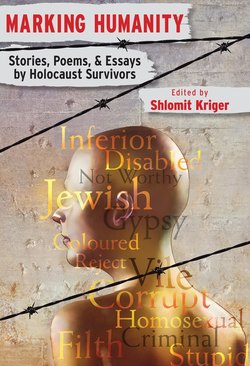Читать книгу Marking Humanity: Stories, Poems, & Essays by Holocaust Survivors - Shlomit Editor Kriger - Страница 26
На сайте Литреса книга снята с продажи.
Kristallnacht: The Night of Broken Glass
ОглавлениеFred M. B. Amram
I remember November 8, 1938 quite clearly. Any Jew living in Nazi Germany on that day will have clear memories of the Night of Broken Glass (Kristallnacht).
Even before Kristallnacht, Jewish men disappeared. Later, the Gestapo (German Secret State Police) came for the families. But in the early days they only came for the men. The soldiers would knock on doors and then take the Jewish men away. No one knew for sure in those early days where they were being taken, although there were stories. I think the kosher butcher disappeared first. Was his name Mandelbaum? A boy remembers names like Herr Mandelbaum, Mr. Almond Tree. Ironic that this man, whose apron was usually covered with blood, would be the first to go.
Whenever the tall uniformed men with their shiny boots and gruff tones knocked on our door, Papa wasn’t home. He was “out on business.” Because I was a youngster, no one trusted me with real information.
The truth, learned much later, was that he had “ways of knowing” and would disappear “downstairs.” We lived on the fourth floor of an apartment building. I never found out how far “downstairs” he went to the apartment of some Christians where he was hidden under a bed. I can’t shake the image of this tiny man fitting comfortably under a bed. I was never told the names of the righteous Christians who hid my Papa. Even when I questioned him directly, in his later and more comfortable years, he wouldn’t reveal their names, their apartment number, or even the floor on which they lived. They were simply “downstairs.”
Decades later, on a continent far away, Papa still protected these good people—not wanting to give them away.
And then came Kristallnacht. On November 9 and 10, Jewish shop windows were smashed. Some have described how men and women were humiliated and beaten on the streets. Others described how Jews were kicked while forced to clean streets with toothbrushes. However, for me, that night began in the evening of November 8, a Tuesday, as we stood on our balcony terrified by the sky’s fiery glow. All of the synagogues in my city of Hanover were looted and burned. Watching the fires, we knew that Kristallnacht was not a good night to be out. Yet, Papa disappeared again. I was told that he was going out “on business,” just as he did whenever the Gestapo came knocking.
Papa missed supper. When he finally came home, he reported that he had not been with the Christians “downstairs.” He was carrying a huge bundle covered with large rags and blankets. Was it a body? When the wrappings were removed, I could see that they had sheltered a Torah (Jewish Bible) almost as big as my Papa. He had rescued the holy scroll from our local synagogue while the building was aflame.
Mutti, my mother, scolded him. “Why take the risk? One should take precautions. And why bring a Torah into an apartment where even radios are forbidden?”
Radios! I remember when the Gestapo came to all Jewish homes hunting for radios. The men in shiny, black boots searched every room. Radios were verboten. Contact with the outside world was forbidden.
I remember feeling like the man of the house while Papa was “away on business.” I was, in fact, a frightened little boy. I don’t know if I cried or not. But I did stand in front of my mother, not behind.
“Why bring a Torah into an apartment where even radios are forbidden?” Mutti asked again. A meaningful question! A full-sized Torah on the fourth floor of an apartment building would put all of the residents at risk. “Hero” was not a word that entered the evening’s conversation. I didn’t hear talk of “hero” until years later, when we were safely settled in the United States.
Papa had no plan for the Torah. The rabbi would know what to do. Wait until nightfall. Of course, no one told the young child, a bright five-year-old, where one would find a rabbi on Kristallnacht.
When I awoke the next morning, the Torah was gone. Apparently, the rabbi did know what to do. Papa was quite pleased with himself. I was only told that, again, Papa had been “out on business.”
